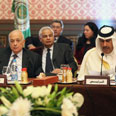
The Arab League will call on the UN Security Council to pass a resolution creating a joint peacekeeping force for Syria.
According to a draft resolution to be adopted by Arab League foreign ministers meeting in Cairo on Sunday, the 22-member group will also call for an immediate ceasefire in Syria. It demands that regime forces lift the siege on neighborhoods and villages and pull troops and their heavy weapons back to their barracks.
Syria is unlikely to accept a joint UN-Arab League peacekeeping force.
Related articles:
- Russian FM: West 'hysterical' over Syria
- US: Satellite images show Assad's 'ruthlessness'
- Op-ed: West should strike Syria
- Op-ed: West should strike Syria
The draft also calls on Syrian opposition groups to unite ahead of a Feb. 24 meeting of the "Friends of Syria" group," which includes the United States, its European allies and Arab nations working to end the 11-month-old conflict in Syria.
"The time has come for a decisive action to stop the bloodshed suffered by the Syrian people since the start of last year," Arab League chief Nabil Elaraby told the Arab foreign ministers. "We must move quickly in all directions ... to end the cycle of violence in Syria."
Meanwhile, officials said the Sudanese head of the Arab League observer mission to Syria resigned on Sunday.

'Decisive action to stop the bloodshed.' Elaraby (Photo: AFP)
The officials said Elaraby had accepted the resignation of Gen. Mohammed Ahmed Al-Dabi, the head of the Syrian observer mission, and nominated former Jordanian Foreign Minister Abdul-Illah al-Khatib as the new envoy. A decision on al-Khatib's nomination would be made later in the day by Arab foreign ministers meeting in the Egyptian capital.
There was no word on the reasons behind Al-Dabi's resignation, but the Sudanese general was harshly criticized for his management of the monitors mission, which was perceived by the Syrian opposition and many protesters to have provided a cover for the regime's continued crackdown.
Al-Dabi was also criticized for being a longtime aide of Sudanese President Omar al-Bashir, himself indicted by the Hague-based International Criminal Court for crimes against humanity in Sudan's western Darfur region, where a revolt against the Khartoum government began in 2003 but has petered out about five years later.
"The new mission must be totally different from the previous one," Elaraby told the Arab foreign ministers. "The previous experience has shown that there can be no restoration of security without a political vision."
The Arab League has been at the forefront of regional efforts to end 11 months of bloodshed in Syria.
The group put forward a plan that President Bashar Assad agreed to in December, then sent in monitors to check whether the Syrian regime was complying. But when it became clear that Assad's regime was flouting the terms of the agreement and killings went on, the League pulled the observers out last month.
Foreign ministers from the Gulf Cooperation Council — Saudi Arabia, Kuwait, United Arab Emirates, Oman, Qatar and Bahrain — are also proposing the expulsion of Syrian ambassadors from all Arab League nations during the meeting in Cairo. The GCC ministers also proposed that Arab nations withdraw their ambassadors from Damascus, according to the officials.
The six nations, particularly Saudi Arabia and Qatar, have been campaigning for a tougher stand against Assad's regime and may offer formal recognition of the National Syrian Council, the largest of Syria's opposition groups, at Sunday's meeting.
Assad's regime has pursued a harsh crackdown against the uprising since it began last March. The UN estimates that 5,400 people have been killed since March, but that figure is from January, when the world body stopped counting because the chaos in Syria has made it all but impossible to check the figures. Hundreds are reported to have been killed since.
- Receive Ynetnews updates
directly to your desktop















